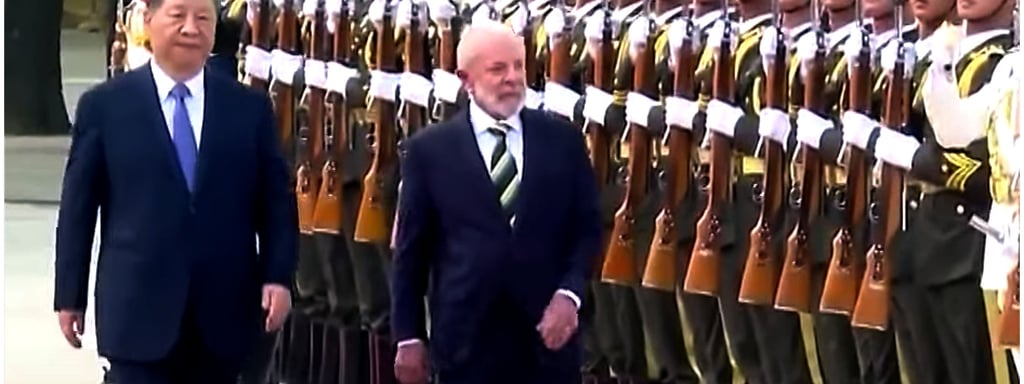Brazil's AGU Mandate to Remove Online Content on Lula's China Trip Sparks Free Speech Debate.
Brazil's AGU Mandate to Remove Online Content on Lula's China Trip Sparks Free Speech Debate and Democratic Backlash. Brazil's Attorney General's Office (AGU) has issued a controversial mandate demanding the removal of online content discussing President Luiz Inácio Lula da Silva and First Lady Janja Lula da Silva's trip to China.
Evertpm Faustino
5/20/20253 min leer


Brazil's AGU Mandate to Remove Online Content on Lula's China Trip Sparks Free Speech Debate and Democratic Backlash
Introduction:
Brazil's Attorney General's Office (AGU) has issued a controversial mandate demanding the removal of online content discussing President Luiz Inácio Lula da Silva and First Lady Janja Lula da Silva's trip to China. This decision has ignited a fierce debate regarding the boundaries of free speech, the government's role in online discourse moderation, and growing concerns about democratic backsliding, particularly given the similarities to China's restrictive information practices. This debate unfolds amidst rising disapproval rates for the Lula administration.
Decision Context and Government Image Deterioration:
The AGU justified its action by claiming the targeted content contained false and decontextualized information, aiming to tarnish the president and first lady's image. The decision relied on legal provisions allowing the government to act against the spread of misinformation deemed to compromise public order or national security. However, the choice of China—a nation notorious for its severe limitations on information and expression—as a destination for the presidential visit casts a long shadow over the AGU's mandate. The perception that the Brazilian government is adopting practices akin to those in China erodes its credibility and fuels distrust in its commitment to democratic values. Furthermore, recent polls indicate a surge in government disapproval, amplifying criticism of the AGU's decision.
Recent surveys, such as those from Paraná Pesquisas, show President Lula's disapproval rating reaching 57.4%. This data signifies a growing rejection of the administration.
Reactions and Criticism:
The AGU's decision has triggered widespread condemnation from freedom of expression advocates, legal experts, and opposition politicians. They argue that this measure constitutes censorship and represents an assault on press freedom and citizens' right to express themselves.
"The AGU's decision sets a dangerous precedent that threatens democracy and the right to information, resembling the practices of authoritarian nations," stated the Brazilian Association of Investigative Journalism (Abraji).
"The government cannot wield state power to silence criticism and dissenting opinions, especially when it evokes censorship methods employed by countries with a history of repression," declared an opposition lawmaker.
AGU Defense:
The AGU defends the legality of its decision, asserting that the measure aims to protect society from the proliferation of false information that could incite instability and damage the nation's reputation.
"The government has a duty to act against the dissemination of falsehoods that can jeopardize public order," affirmed an AGU representative.
"Freedom of expression is not absolute and has legal limitations," they added.
Implications and Developments:
The AGU's directive raises crucial questions about the balance between freedom of speech and the necessity to combat disinformation. The case also reignites the discussion on the role of digital platforms in content moderation and the need for online environment regulation. Concerns about potential democratic backsliding intensify, considering the context of the China visit and the similarity of the measures taken to China's censorship practices. The increasing disapproval of the government, as evidenced by polls, could further amplify the negative public perception of this decision.
Possible Additional Topics for International Readers:
Analysis of the legal provisions cited by the AGU.
Comparison with similar decisions in other countries, including China.
Impact of the decision on upcoming elections.
The role of digital platforms in content moderation globally.
The importance of media literacy in combating disinformation.
The impact of the visit to China and the similarity of practices on Brazil's international relations.
Analysis of how the government's declining approval ratings might influence future political decisions.
Conclusion:
The AGU's decision to remove online content concerning Lula and Janja's China trip has sparked a heated debate about the boundaries of free expression in Brazil. This case underscores the complexity of the issue and the critical need for open and transparent dialogue regarding the government's role in moderating online discourse, particularly concerning the erosion of government image and fears of democratic regression. The public opinion poll data adds another layer of complexity to the scenario, indicating that the administration faces significant challenges in terms of public trust.
